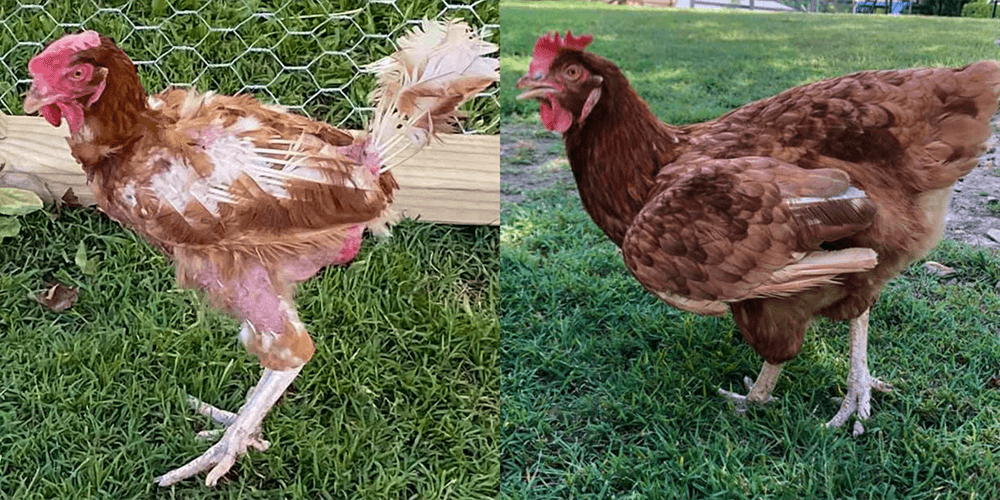As you stroll through the supermarket, casually checking off items like dish soap and toilet roll, eggs may seem like just another item to tick off.
So ordinary is this act, you may not even notice cartons adorned with imagery of happy hens in vast fields living content lives.
Sadly, this could not be further from the truth of the lives of chickens in commercial egg production systems, caged, barn, organic or free range. Many are subject to brutal debeaking, the slaughtering of male chicks and starvation, are our eggs really cruelty-free?
What really happens on an egg farm?*
The suffering of a chicken on an egg farm begins before they even hatch. When fertilised, eggs are kept in incubators until they hatch. In nature, this is something that is done by the mother. Shattering the idea painted in our minds (and on cartons) of a loving mother hen caring for her egg.
Chicks are then placed on a conveyor belt to check if they are male or female. Male chicks are deemed “useless” to egg farmers, and along with some weaker females, are immediately killed.
How they are slaughtered is even more brutal. Suffocation with gas or maceration (blending alive) is common practice. 12 million are killed each year, in Australia alone.
The suffering does not end there however, those who do make it through the conveyer to the farm are first debeaked. This is exactly how it sounds, chick’s highly sensitive beaks are clipped without any pain medication.
Why is this done? To reduce feather pecking, where birds peck and pull out the feathers of other birds. Why are the chickens pecking? Because they have often been stripped of basic necessities such as space, nutrients and maternal bonding. All while subject to extreme stress. The extreme inactivity of, due to overcrowding in their living spaces, can also result in hens developing disuse osteoporosis. Their muscles and bones essentially waste away.
Sadly, this is not all, forced moulting is also common practice. This is when farmers remove food, water (or both) and manipulate lighting. As moulting occurs naturally in birds, linked to the changing seasons, farmers often try to recreate this process when the flock’s egg production rate begins its natural decline. All in an attempt to kick-start high production again.
This is deemed ‘necessary’ as the hens rarely naturally moult while in the unnatural conditions of an egg farm. However, research has shown that fasting is not necessary, and other tactics have been shown as effective as water deprivation. Yet these cruel practices continue.
As you can imagine, this process causes stress and discomfort to the hens and can harm the skeletal system. All to increase the production of eggs as when normal feed consumption is resumed, egg production is typically higher.
When egg production drops again, usually after 18 months hens are culled. Culled at less than a quarter of their natural life span, these hens are otherwise healthy and still lay eggs – just not up to the standard needed to keep their lives.
They are then replaced with younger hens for the process to begin all over again. This is when we are usually alerted to support in rescuing those set to be culled. We help rehabilitate rescue and rehome hundreds of hens each year, helping to find their forever home with a loving adoption family.
*Disclaimer: all of these practices discussed are common throughout egg farms, however not all egg farms participate in these.
Hens lay eggs anyway… so why not take them?
Of course, reducing or cutting out eggs is a huge step. This can be difficult at first, but there are plenty of egg substitutes to use in cooking and baking. These include ‘flax egg’ (a mixture of flaxseed and water left to become sticky), egg replacer powder and silken tofu.
If you have the space and are keen to still have eggs, having your own backyard flock is the way to go. Chickens are a great addition to any family: friendly, low-maintenance and inexpensive. Adopting a chicken rescued from an egg farm saves a life and gives a chance for these hens who have known no love to be part of a family.
“Words cannot describe the joy that our 3 adopted ex-factory farm hens have brought to our home. To see them being able to enjoy the sunlight, scratch in the dirt and forage in the grass is a constant delight. Every chicken deserves these basic pleasures!”
Tamsin, Rescue Hen Adopter
You can see for yourself the transformation a hen can go through from the harsh conditions of an egg farm to their loving forever home here in Delores.

If you aren’t able to adopt, here some other ways you can help are:
- Support animal charities: Many organiszations work to improve the lives of hens and other farm animals. Consider supporting these charities through donations, volunteering, or by spreading the word about their work on social media.
- Support animal charities: Many organiszations work to improve the lives of hens and other farm animals. Consider supporting these charities through donations, volunteering, or by spreading the word about their work on social media.
- Support legislation that promotes animal welfare: Many countries have laws in place to protect the welfare of animals in factory farms, but these laws are often weak and poorly enforced. Support efforts to strengthen these laws and hold egg farmers accountable for the treatment of their animals.
This is an internal struggle we must all face when choosing to live more compassionately and whether you chose to reduce or eliminate it is personal to you and you alone.
We hope only to shed some light on the situation, so you have the opportunity to ask yourself these questions. Whether free-range or not, chickens are often subject to similar conditions.